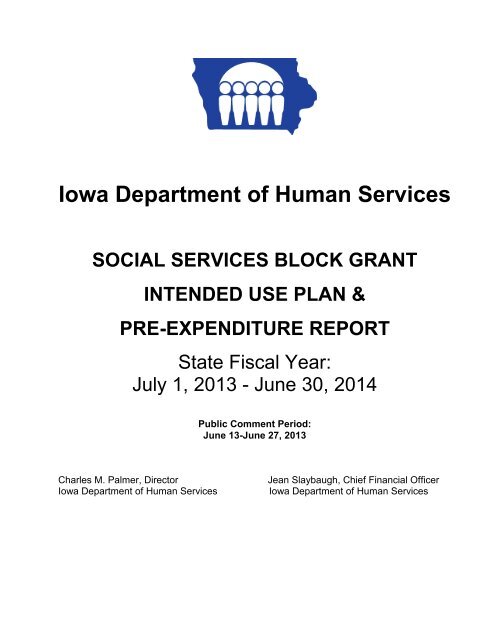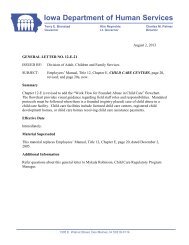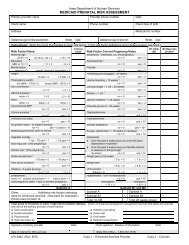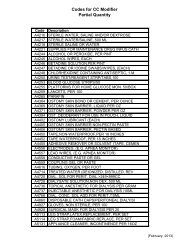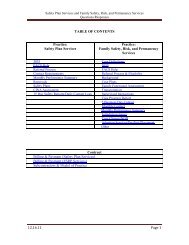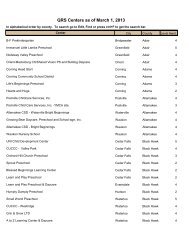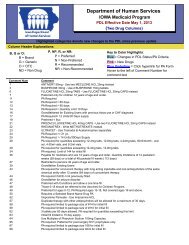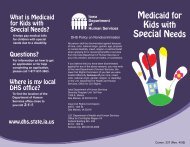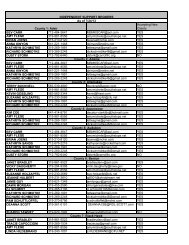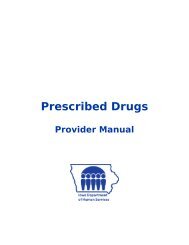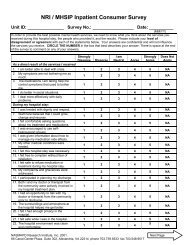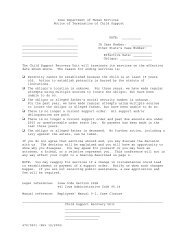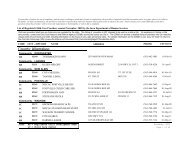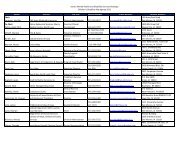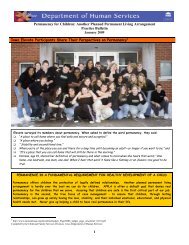Iowa Department of Human Services
Iowa Department of Human Services
Iowa Department of Human Services
Create successful ePaper yourself
Turn your PDF publications into a flip-book with our unique Google optimized e-Paper software.
<strong>Iowa</strong> <strong>Department</strong> <strong>of</strong> <strong>Human</strong> <strong>Services</strong><br />
SOCIAL SERVICES BLOCK GRANT<br />
INTENDED USE PLAN &<br />
PRE-EXPENDITURE REPORT<br />
State Fiscal Year:<br />
July 1, 2013 - June 30, 2014<br />
Public Comment Period:<br />
June 13-June 27, 2013<br />
Charles M. Palmer, Director<br />
<strong>Iowa</strong> <strong>Department</strong> <strong>of</strong> <strong>Human</strong> <strong>Services</strong><br />
Jean Slaybaugh, Chief Financial Officer<br />
<strong>Iowa</strong> <strong>Department</strong> <strong>of</strong> <strong>Human</strong> <strong>Services</strong>
<strong>Iowa</strong> <strong>Department</strong> <strong>of</strong> <strong>Human</strong> <strong>Services</strong><br />
Terry E. Branstad Kim Reynolds Charles M. Palmer<br />
Governor Lt. Governor Director<br />
[DATE]<br />
Ms. Marsha Werner<br />
Office <strong>of</strong> Community <strong>Services</strong><br />
Administration for Children and Families<br />
U.S. <strong>Department</strong> <strong>of</strong> Health and <strong>Human</strong> <strong>Services</strong><br />
370 L’Enfant Promenade, SW<br />
Washington, DC 20447<br />
Dear Ms. Werner:<br />
Enclosed is the Social <strong>Services</strong> Block Grant (SSBG) Intended Use Plan and Pre-Expenditure Report<br />
for the State <strong>of</strong> <strong>Iowa</strong>. The report covers the State Fiscal Year 2014, for the period <strong>of</strong> 07/01/13 through<br />
06/30/2014.<br />
Comments or questions regarding this report should be addressed to the <strong>Iowa</strong> SSBG contact staff:<br />
Jody Lane-Molnari, Executive Officer II<br />
<strong>Iowa</strong> <strong>Department</strong> <strong>of</strong> <strong>Human</strong> <strong>Services</strong><br />
Division <strong>of</strong> Fiscal Management<br />
Hoover State Office Building<br />
1305 E Walnut Street<br />
Des Moines, IA 50319-0114<br />
(O) 515-281-6027<br />
(F) 515-564-4042<br />
jlanemo@dhs.state.ia.us<br />
The SSBG <strong>of</strong>ficial receiving the SSBG Grant Award is:<br />
Sincerely,<br />
Charles M. Palmer, Director<br />
<strong>Iowa</strong> <strong>Department</strong> <strong>of</strong> <strong>Human</strong> <strong>Services</strong><br />
Hoover State Office Building<br />
1305 E Walnut Street<br />
Des Moines, IA 50319-0114<br />
(O) 515-281-5452<br />
(F) 515-281-4980<br />
cpalmer1@dhs.state.ia.us<br />
Jean M Slaybaugh, CFO<br />
IDHS, Division <strong>of</strong> Fiscal Management<br />
2
TABLE OF CONTENTS<br />
Topic<br />
Page<br />
#<br />
Overview 4<br />
Goals 4<br />
Legal Requirements 5<br />
Changes to the Pre-Expenditure Report 5<br />
Public Participation 5<br />
Policy on Nondiscrimination 6<br />
Application for <strong>Services</strong> 6<br />
Eligibility 7<br />
Glossary <strong>of</strong> Terms 8<br />
Funding 11<br />
Standards for Living Arrangements for SSI Recipients 13<br />
TABLES<br />
Table 1 - Family Income Table 7<br />
Table 2 - Funding by Source and Category <strong>of</strong> Expenditure 11<br />
Table 3 - SSBG Categories <strong>of</strong> Expenditure 12<br />
PRE-EXPENDITURE REPORTING FORM<br />
Part A. Estimated Expenditures and Proposed Provision Method 15<br />
Part B. Estimated Recipients 16<br />
DOCUMENTATION OF PUBLIC NOTICE & CERTIFICATIONS<br />
Certifications -- Attached at the end <strong>of</strong> the Final SFY 2014 Pre-Expenditure Report<br />
3
OVERVIEW<br />
We proudly proclaim our Vision: “The <strong>Iowa</strong> <strong>Department</strong> <strong>of</strong> <strong>Human</strong> <strong>Services</strong> makes a<br />
positive difference in the lives <strong>of</strong> <strong>Iowa</strong>ns we serve through effective and efficient<br />
leadership, excellence, and teamwork.” The Mission <strong>of</strong> the <strong>Iowa</strong> <strong>Department</strong> <strong>of</strong> <strong>Human</strong><br />
<strong>Services</strong> is to help individuals and families achieve safe, stable, self-sufficient, and healthy<br />
lives, thereby contributing to the economic growth <strong>of</strong> the state. We do this by keeping a<br />
customer focus, striving for excellence, sound stewardship <strong>of</strong> state resources, maximizing<br />
the use <strong>of</strong> federal funding and leveraging opportunities, and by working with our public and<br />
private partners to achieve results.<br />
The <strong>Iowa</strong> <strong>Department</strong> <strong>of</strong> <strong>Human</strong> <strong>Services</strong> (DHS) provides a variety <strong>of</strong> social services to<br />
help individuals and families improve their lives. <strong>Iowa</strong> DHS is the State agency designated<br />
to administer the State’s SSBG program. The program services are designed to assist<br />
individuals or families to become less dependent on others for financial support or personal<br />
care; to protect vulnerable children and/or adults; to avoid unnecessary or premature<br />
institutionalization; and to gain appropriate placement, if institutionalization is necessary.<br />
This report outlines those services in <strong>Iowa</strong> funded with federal Social <strong>Services</strong> Block Grant<br />
funds and related state funds during the 2014 State Fiscal Year that begins July 1, 2013<br />
and ends June 30, 2014.<br />
GOALS<br />
Each State has the flexibility to determine what services will be provided, who is eligible to<br />
receive services, and how funds are distributed among various services or programs within<br />
the State. Target population is determined by each State, according to these needs and<br />
must be directed at one or more <strong>of</strong> the five broad statutory goals.<br />
<strong>Iowa</strong>’s intended use plan for its SSBG allocation is to advance one or more <strong>of</strong> the following<br />
SSBG goals:<br />
Achieving or maintaining economic self-support to prevent, reduce, or eliminate<br />
dependency;<br />
Achieving or maintaining self-sufficiency, including reduction or prevention <strong>of</strong><br />
dependency;<br />
Preventing or remedying neglect, abuse, or exploitation <strong>of</strong> children and adults<br />
unable to protect their own interests, or preserving, rehabilitating or reuniting<br />
families;<br />
Preventing or reducing inappropriate institutional care by providing for communitybased<br />
care, home-based care, or other forms <strong>of</strong> less intensive care;<br />
Securing referral or admission for institutional care when other forms <strong>of</strong> care are not<br />
appropriate, or providing services to individuals in institutions<br />
4
LEGAL REQUIREMENTS<br />
The federal government established the Social <strong>Services</strong> Block Grant (SSBG) in the<br />
Omnibus Budget Reconciliation Act <strong>of</strong> 1981 (Public Law 97-35). The SSBG replaced the<br />
previous federal social services program known as Title XX, and gave the states<br />
substantial discretion in the use <strong>of</strong> block grant funds. Each State’s SSBG grant is<br />
determined by a statutory formula based on the State’s population. States are fully<br />
responsible, within the limitations <strong>of</strong> the law, for determining the use <strong>of</strong> their grant funds.<br />
The SSBG funds must be spent according to requirements in the Code <strong>of</strong> Federal<br />
Regulations, Title 45, Part 96, as amended.<br />
The <strong>Iowa</strong> regulations, which apply to SSBG eligibility for services and their delivery, are<br />
found in the <strong>Iowa</strong> Administrative Code, Section 441, Chapters 130 (General Provisions)<br />
and 153 (Social <strong>Services</strong> Block Grant). In addition, the Code <strong>of</strong> <strong>Iowa</strong> also covers social<br />
services in the “Administrative Procedures Act” (Chapter 17A), “The <strong>Department</strong> <strong>of</strong> <strong>Human</strong><br />
<strong>Services</strong>” (Chapter 217), and “Child and Family <strong>Services</strong>” (Chapter 234).<br />
CHANGES TO THE PRE-EXPENDITURE REPORT<br />
An amendment process makes it possible to respond to changing needs throughout the<br />
year. Any decision to add a service, stop a service, or change the period <strong>of</strong> time a service<br />
is available is publicly posted in the full-time DHS <strong>of</strong>fices.<br />
Most <strong>of</strong> these amendments are posted for 30 days before the change takes place.<br />
However, if funding is not available to continue a service, an amendment may take effect<br />
as soon as it is posted.<br />
PUBLIC PARTICIPATION<br />
The <strong>Iowa</strong> Legislature held a Public Hearing on March 25, 2013 related to appropriating<br />
federal funds made available from federal block grants (HSB221), including the Social<br />
Service Block Grant. There was no outside testimony or comments on the bill. HF614 was<br />
passed by the <strong>Iowa</strong> Legislature and is pending the Governor’s signature.<br />
<strong>Iowa</strong> publishes the proposed intended use plan and pre-expenditure report to inform the<br />
State’s citizens and decision-makers <strong>of</strong> its plans for implementing the SSBG program and<br />
to meet the SSBG pre-expenditure reporting requirements. The Pre-Expenditure Report is<br />
posted on the DHS website for 24-hour access at www.dhs.state.ia.us under “Reports”.<br />
The public comment period for the proposed State Fiscal Year 2014 intended use plan and<br />
pre-expenditure report is scheduled to be from June 13 – June 27, 2013.<br />
Public notices are posted to provide the public an opportunity to submit comments. <strong>Iowa</strong><br />
considers all feedback received from the public, including service recipients, service<br />
providers, and other interested citizens, throughout the program year and in its preparation<br />
<strong>of</strong> updates, and if necessary, to reflect substantial changes.<br />
5
POLICY ON NONDISCRIMINATION<br />
It is the policy <strong>of</strong> the <strong>Iowa</strong> <strong>Department</strong> <strong>of</strong> <strong>Human</strong> <strong>Services</strong> to provide equal treatment in<br />
employment and provision <strong>of</strong> services to applicants, employees, and clients without regard<br />
to race, color, national origin, sex, religion, age, disability, political belief, or veteran status<br />
If any applicant for or recipient <strong>of</strong> services has reason to believe DHS or any <strong>of</strong> its vendors,<br />
providers, or contractors have discriminated against him or her for any <strong>of</strong> the reasons<br />
stated above, the person may use the discrimination complaint procedures <strong>of</strong> the following<br />
agencies:<br />
(1) <strong>Iowa</strong> <strong>Department</strong> <strong>of</strong> <strong>Human</strong> <strong>Services</strong>;<br />
(2) <strong>Iowa</strong> Civil Rights Commission (if a person feels he or she was treated differently<br />
because <strong>of</strong> his or her race, creed, color, national origin, sex, religion, or disability); or<br />
(3) U.S. <strong>Department</strong> <strong>of</strong> Health and <strong>Human</strong> <strong>Services</strong>, Office for Civil Rights.<br />
For assistance or consultation, the person may contact a DHS <strong>of</strong>fice, a member <strong>of</strong> the<br />
DHS Affirmative Action committee, or:<br />
<strong>Iowa</strong> Civil Rights Commission<br />
Grimes State Office Building<br />
400 E. 14th Street<br />
Des Moines, IA 50319-1004<br />
Phone: 515-281-4121<br />
Toll Free: 1-800-457-4416<br />
Fax 515-242-5840<br />
U.S. <strong>Department</strong> <strong>of</strong> Health and <strong>Human</strong> <strong>Services</strong><br />
Office for Civil Rights, Region VII<br />
601 East 12th Street, Room 248<br />
Kansas City, Missouri 64106<br />
APPLICATION FOR SERVICES<br />
A person may request service at any DHS field <strong>of</strong>fice. The request will be acted upon<br />
within 30 days <strong>of</strong> the date the application form is completed unless otherwise indicated in<br />
the <strong>Iowa</strong> Administrative Code. For local purchase services, a person may also apply at the<br />
Central Point <strong>of</strong> Coordination. There is no fee for application, however there may be a cost<br />
to the client for services that are received based upon income.<br />
6
ELIGIBILITY<br />
To be eligible for a service a person must be found to need the service and be a resident<br />
<strong>of</strong> the state <strong>of</strong> <strong>Iowa</strong>. For some services, financial eligibility may also be required. To be<br />
financially eligible, the family income must fall within the income guidelines in Table 1, as<br />
defined in <strong>Iowa</strong> Administrative Code 441—130.3(1)”d”(2).<br />
Persons who qualify for an income maintenance program such as the Family Investment<br />
Program (FIP), Supplemental Security Income (SSI), or State Supplemental Assistance<br />
(SSA) are considered financially eligible.<br />
For local purchase services to be provided through an approved county management plan,<br />
eligibility is based upon the criteria established in this plan. A copy <strong>of</strong> the county<br />
management plan may be obtained from the county or the DHS Division <strong>of</strong> Mental Health<br />
and Disability <strong>Services</strong>. For local purchase services without an approved county<br />
management plan, eligibility is based upon eligibility criteria established in the last<br />
approved county management plan.<br />
TABLE 1<br />
FAMILY INCOME TABLE<br />
Family Size<br />
Monthly Gross Income<br />
For <strong>Services</strong><br />
1 583<br />
2 762<br />
3 942<br />
4 1121<br />
5 1299<br />
6 1478<br />
7 1510<br />
8 1546<br />
9 1581<br />
10 1612<br />
* *Add $33 for each additional person<br />
7
GLOSSARY OF TERMS<br />
Note: The definitions in this glossary are brief descriptions <strong>of</strong> block grant funded services.<br />
The full legal definitions may be found in the <strong>Iowa</strong> Administrative Code, Section 441, or as<br />
noted below.<br />
Adult Support - Community assistance services, individual treatment services, social<br />
contact services and supervisory services. These services encourage and assist<br />
adults to obtain or more fully use community services that promote health and wellbeing.<br />
Case Management (Field Operations Social <strong>Services</strong> Casework) - Means working with the<br />
client to:<br />
a) assess and identify individual and family strengths and needs,<br />
b) develop a case plan to provide appropriate supports and services,<br />
c) implement the case plan using community resources,<br />
d) coordinate and monitor the provision <strong>of</strong> services,<br />
e) evaluate client progress and the case plan to determine continued need for<br />
services, and<br />
f) plan for discharge.<br />
Central Administration – The Central Administration appropriation provides for the<br />
administrative direction and coordination for all programs and services provided by<br />
the <strong>Department</strong>, including program planning, policy formulation, budget formulation,<br />
purchasing, accounting, data processing, and systems development to generate<br />
provider payments.<br />
Child and Family <strong>Services</strong> - The Child and Family <strong>Services</strong> appropriation provides funds<br />
for services to children and families and for activities to support those services.<br />
<strong>Services</strong> are designed to protect children from abuse and neglect, prevent out-<strong>of</strong>home<br />
placement, provide temporary foster care for children unable to remain in their<br />
own homes, and provide permanent homes for children who cannot return home.<br />
SSBG funds are used for family centered child welfare services (i.e. Safety Plan<br />
<strong>Services</strong> and Family Safety, Risk, and Permanency <strong>Services</strong>), foster care services<br />
(i.e., family foster care, group care, emergency juvenile shelter care), and Child<br />
Welfare Emergency <strong>Services</strong> (CWES).<br />
Child Welfare Emergency <strong>Services</strong> (as defined in the <strong>Department</strong> <strong>of</strong> <strong>Human</strong> <strong>Services</strong>’<br />
CWES contracts) - An array <strong>of</strong> short term and temporary interventions that are<br />
provided to the target population by the child welfare system and focus on children’s<br />
safety, permanence, and well-being. CWES range from the least restrictive<br />
approaches that can be used, e.g., crisis interventions such as family conflict<br />
mediations or in-home interventions, to more restrictive emergency services<br />
including out-<strong>of</strong>-home placements with relatives, foster families, or emergency<br />
juvenile shelter care (as permitted by the <strong>Iowa</strong> Code).<br />
8
County Administration – Local agency expenses, the portion <strong>of</strong> the cost <strong>of</strong> maintaining a<br />
local <strong>of</strong>fice, which is reimbursed to the county.<br />
DHS - The <strong>Iowa</strong> <strong>Department</strong> <strong>of</strong> <strong>Human</strong> <strong>Services</strong>.<br />
Dependent Adult Protection - (Protective <strong>Services</strong> - Adults) A service in which a DHS<br />
worker provides an evaluation <strong>of</strong> a reported abuse <strong>of</strong> a dependent adult which<br />
occurred because <strong>of</strong> the actions or omissions <strong>of</strong> caretakers or <strong>of</strong> dependent adults<br />
themselves. Some examples <strong>of</strong> abuse are non-accidental physical injury, sexual<br />
abuse, inadequate food, clothing, shelter, or items necessary for the dependent<br />
adult’s health and welfare. This service also includes providing or arranging for<br />
intervention or court referral that remedies an actual or potential abuse problem.<br />
Family-Centered Supportive Child Welfare <strong>Services</strong> (as defined by IAC 441- Chapter<br />
172, Division IV) are specific services that DHS workers may approve and deliver at<br />
various points during the course <strong>of</strong> a child’s and family’s involvement with the<br />
agency’s child welfare system to address the children’s safety, permanency, and<br />
well-being needs. These services include Drug Testing, Family Team Meeting<br />
Facilitation, Legal <strong>Services</strong> for Permanency, and service area specific services.<br />
Family-Life Home - (Foster Care <strong>Services</strong> - Adults) A program for adults who want and<br />
need family living. The department certifies provider families who furnish a home for<br />
not more than two clients at a time, giving them room, board, laundry, and<br />
encouragement to share in family living and participate in the social, cultural,<br />
educational, religious, and other activities <strong>of</strong> the community.<br />
Family Safety, Risk, and Permanency (FSRP) <strong>Services</strong> (as defined by DHS Contracts<br />
for FSRP <strong>Services</strong> as well as IAC 441- Chapter 172, Division III) - use strategies<br />
and family focused interventions designed to deliver a flexible array <strong>of</strong> culturally<br />
sensitive interventions and supports to achieve safety and permanency for a child or<br />
children with an open DHS child welfare case, regardless <strong>of</strong> the setting in which the<br />
child resides. FSRP <strong>Services</strong> are the primary family-centered service intervention<br />
purchased by the <strong>Department</strong>. The outcome may be to maintain children safely<br />
within their own families or with relatives, to reunite children safely with their parents<br />
or other relatives, or to achieve alternative permanent family connections for the<br />
child.<br />
Field Operations – The Field Operations appropriation funds the DHS service delivery<br />
system provided by front-line field staff who deliver and coordinate an array <strong>of</strong> social<br />
services and economic assistance to children, families and dependent adults<br />
throughout the State. Staff are located in county-based <strong>of</strong>fices across <strong>Iowa</strong> in order<br />
to provide services at a local level, whenever possible. There are five service<br />
delivery areas that span the State, and a sixth, centralized area for common<br />
services, such as child care assistance and reporting <strong>of</strong> changes to households, in<br />
order to gain efficiencies and provide costs effective solutions. All six service areas<br />
are part <strong>of</strong> the Division <strong>of</strong> Field Operations that also provides help desk services,<br />
technical support, and customer service to DHS, other governmental agencies, and<br />
<strong>Iowa</strong>ns.<br />
9
Foster Care <strong>Services</strong> - Child – Foster care is designed to protect child safety and to<br />
ensure children have a permanent family. The DHS worker provides foster care<br />
service by arranging for and monitoring substitute 24-hour care for a child while<br />
working to achieve a permanent placement for the child. The caregiver provides<br />
food, lodging, training, and supervision in a foster family home, group care facility, or<br />
shelter care facility. <strong>Services</strong> may be purchased from private agencies. SSBG,<br />
Medicaid, and state funds are used for the services. Maintenance is funded from<br />
state and IV-E funds.<br />
Local Purchase/State Payment Program - Residential and other disability-related<br />
services as specified in an approved county management plan, which are provided<br />
to adults or children with mental illness, intellectual disability, or a developmental<br />
disability.<br />
Safety Plan (SP) <strong>Services</strong> (as defined by DHS Contracts for Safety Plan <strong>Services</strong> as well<br />
as IAC 441- Chapter 172, Division II) provide oversight <strong>of</strong> children who are assessed<br />
by the DHS worker to be conditionally safe and in need <strong>of</strong> interventions (services<br />
and activities) to move them from conditionally safe to safe status during a timelimited<br />
Child Protective or CINA Assessment by providing culturally sensitive<br />
assessment and interventions. <strong>Services</strong> assure that the child(ren) will be safe and<br />
that without such services the removal <strong>of</strong> the child(ren) from the home or current<br />
placement will occur. The services shall provide a flexible array <strong>of</strong> strategies and<br />
interventions to monitor, evaluate, and intervene to ensure the child’s safely; and<br />
evaluate and supplement the protective capacities <strong>of</strong> the child’s caregivers. This<br />
service remediates the circumstances that brought the child to the attention <strong>of</strong> the<br />
<strong>Department</strong>.<br />
SSBG - Funds provided by the federal government for social services described in Title<br />
XXIII, Subtitle C, "Block Grants for Social <strong>Services</strong> <strong>of</strong> the Omnibus Budget<br />
Reconciliation Act <strong>of</strong> 1981" <strong>of</strong> Public Law 97-35. SSBG stands for Social <strong>Services</strong><br />
Block Grant.<br />
Volunteers - The cost for an individual or agency to perform a variety <strong>of</strong> services in<br />
support <strong>of</strong> a structured volunteer program to enhance departmental programs.<br />
<strong>Services</strong> include volunteer recruitment, screening, orientation, recognition, training,<br />
and other appropriate activities.<br />
10
FUNDING<br />
The <strong>Iowa</strong> Legislature allocates the anticipated funding from the Social <strong>Services</strong> Block<br />
Grant. Table 2 provides the estimated amounts and sources <strong>of</strong> funding anticipated for<br />
Social <strong>Services</strong> Block Grant related services in state fiscal year 2014.<br />
Table 2<br />
SOCIAL SERVICES BLOCK GRANT<br />
PROPOSED FUNDING BY SOURCE AND CATEGORY OF EXPENDITURE<br />
SFY 2014<br />
FEDERAL STATE COUNTY TOTAL<br />
FIELD OPERATIONS $12,927,818 $14,531,448 $27,459,266<br />
CENTRAL ADMINISTRATION $1,826,649 $916,935 $2,743,584<br />
COUNTY<br />
ADMINISTRATION $670,148 $2,451,783 $3,121,931<br />
CHILD & FAMILY SERVICES $1,635,783 $32,014,347 $33,650,130<br />
VOLUNTEERS $75,052 $84,660 $159,712<br />
LOCAL PURCHASE /<br />
STATE PAYMENT<br />
PROGRAM $12,374,285 $0 $12,374,285<br />
TOTAL $29,509,735 $47,547,390 $2,451,783 $79,508,908<br />
NOTES:<br />
Federal funds include SSBG and TANF funds used to replace reduced SSBG funding.<br />
The state dollars represent funds available based on FY14 appropriations.<br />
Prepared by:<br />
Victoria Wiedemeier<br />
DHS-Fiscal Management<br />
June 12, 2012<br />
11
Expenditure<br />
Report Line #<br />
and SSBG<br />
Service Name<br />
2. Case<br />
Management<br />
21. Protective<br />
<strong>Services</strong> - Adult<br />
10. Foster Care -<br />
Adult<br />
Table 3<br />
SOCIAL SERVICES BLOCK GRANT<br />
CATEGORIES OF EXPENDITURE<br />
IA DHS Budget<br />
Category<br />
Field Operation<br />
Field Operation<br />
Field Operation<br />
Case Management<br />
IA DHS Program/Service<br />
Dependent Adult Protection (Protective <strong>Services</strong>-Adult)<br />
Family-Life Homes<br />
• Central<br />
31. Administrative Administration<br />
• Central Administration (General Administration)<br />
Costs<br />
• County<br />
Administration<br />
• County Administration (Local Agency Expenses)<br />
11.Foster Care - Child & Family<br />
Child<br />
<strong>Services</strong><br />
Foster Care<br />
13. Home-Based<br />
<strong>Services</strong><br />
Child & Family<br />
<strong>Services</strong><br />
Family Centered Child Welfare <strong>Services</strong> (i.e. Safety Plan<br />
<strong>Services</strong> and Family Safety, Risk, and Permanency <strong>Services</strong>)<br />
29. Other <strong>Services</strong> Volunteers Volunteers<br />
25. Special<br />
<strong>Services</strong> -<br />
Disabled<br />
Local Purchase /<br />
State Payment<br />
Program<br />
Adult Residential <strong>Services</strong> (for persons with disabilities)<br />
Other Disability-Related <strong>Services</strong> as specified in an approved<br />
County Management Plan<br />
This table displays the services that are funded within the categories <strong>of</strong> expenditure on<br />
Table 2 <strong>of</strong> the SSBG Proposed Funding in the Pre-Expenditure Report.<br />
DHS uses a methodology <strong>of</strong> calculating the final costs for the Field Operations Budget<br />
Category (for case management, dependent adult protection, and family-life homes) based<br />
on Random Moment time studies.<br />
12
STANDARDS FOR LIVING ARRANGEMENTS FOR SSI RECIPIENTS<br />
Many <strong>of</strong> the people who use SSBG services are Supplemental Security Income (SSI)<br />
recipients. The following standards apply to residential facilities for these recipients.<br />
Standards for Family Life Homes, corresponding to Foster Homes in Public Law 94-566,<br />
are the responsibility <strong>of</strong> the <strong>Iowa</strong> <strong>Department</strong> <strong>of</strong> <strong>Human</strong> <strong>Services</strong>. A Family Life Home is a<br />
private household <strong>of</strong>fering a protective social living arrangement for one or two eligible<br />
adults. These standards, along with procedures for enforcement <strong>of</strong> these standards are<br />
contained in the <strong>Iowa</strong> Administrative Code 441--Chapter 111. There is no provision for<br />
waiving family life home standards. Homes which do not meet standards are either denied<br />
certification or the existing certification is revoked. A list <strong>of</strong> homes having violated these<br />
standards, including deficiencies involved in each violation which have come to the<br />
attention <strong>of</strong> the DHS, are available free from:<br />
<strong>Iowa</strong> <strong>Department</strong> <strong>of</strong> <strong>Human</strong> <strong>Services</strong><br />
Division <strong>of</strong> Adult, Children, and Family <strong>Services</strong><br />
Hoover State Office Building - 5th Floor<br />
Des Moines, <strong>Iowa</strong> 50319<br />
Family Life Home standards include a section on definition <strong>of</strong> terms, procedures for<br />
application for certification, provisions <strong>of</strong> certification, requirements for certification<br />
pertaining to physical standards, personal characteristics <strong>of</strong> the family, health <strong>of</strong> family,<br />
activities for residents, medical requirements, eligibility requirements, confidentiality,<br />
placement agreements, and emergency care.<br />
Standards for children’s foster care facilities are the responsibility <strong>of</strong> the <strong>Iowa</strong> <strong>Department</strong><br />
<strong>of</strong> <strong>Human</strong> <strong>Services</strong>. These standards are contained in <strong>Iowa</strong> Administrative Code 441--<br />
Chapters 105, 108, 112, 113, 114, 115, and 116. These facilities are licensed, certified, or<br />
approved by the <strong>Department</strong> as one <strong>of</strong> the following:<br />
• Foster family home<br />
• Community residential facility<br />
• Comprehensive residential facility<br />
• Residential facilities for children with intellectual disabilities/developmental<br />
disabilities<br />
• Juvenile shelter care homes<br />
A copy <strong>of</strong> the standards for each type <strong>of</strong> care, a list <strong>of</strong> facilities licensed or approved to<br />
provide each type <strong>of</strong> care, a checklist <strong>of</strong> compliance with the standards for each facility, a<br />
list <strong>of</strong> facilities with provisional licenses due to deficiencies and the deficiencies involved,<br />
are available free from:<br />
<strong>Iowa</strong> <strong>Department</strong> <strong>of</strong> <strong>Human</strong> <strong>Services</strong><br />
Division <strong>of</strong> Adult, Children, and Family <strong>Services</strong><br />
Hoover State Office Building - 5th Floor<br />
Des Moines, <strong>Iowa</strong> 50319<br />
13
Children’s foster care facilities standards include sections on definition <strong>of</strong> terms,<br />
procedures for application, physical standards, health <strong>of</strong> foster family or facility staff,<br />
required reference checks on the family or staff, record care, unannounced visits, rights <strong>of</strong><br />
foster children and required services. Group care facilities also have requirements<br />
regarding drug policies; dental and medical services; dietary requirements; safety<br />
requirements; care plan review and revision; discipline; and staff qualifications.<br />
The Social <strong>Services</strong> Block Grant Report for SFY 2014 includes local purchase services<br />
(see definition <strong>of</strong> local purchase in the “Glossary <strong>of</strong> Terms”). The following information on<br />
one <strong>of</strong> the local purchase services, adult residential services, is provided to meet the public<br />
notice requirements <strong>of</strong> the Keys Amendment. Standards for Residential Care Facilities are<br />
the responsibility <strong>of</strong> the <strong>Department</strong> <strong>of</strong> Inspections and Appeals (DIA). According to <strong>Iowa</strong><br />
law, the standards cover facilities providing 24-hour care for three or more people for a<br />
period exceeding 24 or more consecutive hours. A copy <strong>of</strong> these standards and<br />
administrative rules for enforcement, criteria for variances for each rule, and a list <strong>of</strong><br />
facilities having violated these standards, including deficiencies involved in each violation<br />
that have come to the attention <strong>of</strong> DIA, are available from:<br />
<strong>Iowa</strong> <strong>Department</strong> <strong>of</strong> Inspections and Appeals<br />
Lucas State Office Building<br />
Des Moines, <strong>Iowa</strong> 50319<br />
The standards for Residential Care Facilities include sections on: definition <strong>of</strong> terms;<br />
provisions for variances; procedures for application for license; requirements on changes in<br />
facilities; duties and responsibilities for the administrator; health requirements <strong>of</strong> staff;<br />
personnel practices; admission, transfer and discharge policies; terms <strong>of</strong> contracts with<br />
residents; medical services to residents; records; care and personal services; rights <strong>of</strong><br />
residents; drug policies; dental services; dietary requirements; social service programs;<br />
activities programs; care review; safety requirements; housekeeping procedures; and<br />
requirements for maintenance, garbage disposal, laundry, buildings, equipment,<br />
furnishings, and supplies.<br />
Standards for Supported Community Living <strong>Services</strong> are the responsibility <strong>of</strong> the <strong>Iowa</strong><br />
<strong>Department</strong> <strong>of</strong> <strong>Human</strong> <strong>Services</strong>. This is a program providing services and supervision for<br />
adults and children with mental illness, intellectual disabilities, or developmental disabilities<br />
to enable them to live in an apartment in the community.<br />
The Division <strong>of</strong> Mental Health and Disability <strong>Services</strong> is responsible for the certification<br />
standards for the Supported Community Living <strong>Services</strong> program and for enforcement <strong>of</strong><br />
these standards. A copy <strong>of</strong> the relevant administrative rules may be obtained by writing:<br />
<strong>Iowa</strong> <strong>Department</strong> <strong>of</strong> <strong>Human</strong> <strong>Services</strong><br />
Division <strong>of</strong> Mental Health and Disability <strong>Services</strong><br />
Hoover State Office Building - 5th Floor<br />
Des Moines, <strong>Iowa</strong> 50319<br />
Administrative rules for Supported Community Living <strong>Services</strong> specify an approval process<br />
for programs, procedures for assessment <strong>of</strong> compliance and denial or revocation <strong>of</strong><br />
approval and requirements for living arrangement and program <strong>of</strong> services. They also<br />
detail the standards for governance, administration, program and services and living<br />
arrangement and are found in <strong>Iowa</strong> Administrative Code 441, Chapter 24.<br />
14
Part A. Estimated Expenditures and Proposed Provision Method OMB NO.: 0970-0234<br />
EXPIRATION DATE: 06/30/2014<br />
STATE: IOWA FISCAL YEAR: 2014 REPORT PERIOD: 7/01/2013-6/30/2014<br />
Contact Person: Jody Lane-Molnari Phone Number: 515-281-6027<br />
Title: Executive Officer II<br />
E-Mail Address: jlanemo@dhs.state.ia.us<br />
Agency: <strong>Iowa</strong> <strong>Department</strong> <strong>of</strong> <strong>Human</strong> <strong>Services</strong> Submission Date: 06/28/2013<br />
SSBG Expenditures<br />
SSBG<br />
Allocation<br />
Expenditures <strong>of</strong><br />
Provision Method<br />
Funds<br />
transferred<br />
into<br />
SSBG*<br />
All Other<br />
Federal, State<br />
and Local<br />
funds**<br />
Total<br />
Expenditures Public Private<br />
Service Supported with SSBG Expenditures<br />
1 Adoption <strong>Services</strong><br />
2 Case Management 6,209,055 6,493,819 14,278,600 26,981,474 X<br />
3 Congregate Meals<br />
4 Counseling <strong>Services</strong><br />
5 Day Care--Adults<br />
6 Day Care--Children<br />
7 Education and Training <strong>Services</strong><br />
8 Employment <strong>Services</strong><br />
9 Family Planning <strong>Services</strong><br />
10 Foster Care <strong>Services</strong>--Adults 843 881 1,938 3,662 X<br />
11 Foster Care <strong>Services</strong>--Children 946,795 0 4,428,539 5,375,334 X X<br />
12 Health-Related <strong>Services</strong><br />
13 Home-Based <strong>Services</strong> 0 688,988 27,585,808 28,274,796 X X<br />
14 Home-Delivered Meals<br />
15 Housing <strong>Services</strong><br />
16 Independent/Transitional Living <strong>Services</strong><br />
17 Information & Referral<br />
18 Legal <strong>Services</strong><br />
19 Pregnancy & Parenting<br />
20 Prevention & Intervention<br />
21 Protective <strong>Services</strong>--Adults 109,108 114,112 250,910 474,130 X<br />
22 Protective <strong>Services</strong>--Children<br />
23 Recreation <strong>Services</strong><br />
24 Residential Treatment<br />
25 Special <strong>Services</strong>--Disabled 7,480,233 4,894,052 0 12,374,285 X X<br />
26 Special <strong>Services</strong>--Youth at Risk<br />
27 Substance Abuse <strong>Services</strong><br />
28 Transportation<br />
29 Other <strong>Services</strong>*** 75,052 0 84,660 159,712 X<br />
30 SUM OF EXPENDITURES FOR SERVICES 14,821,086 12,191,852 46,630,455 73,643,393<br />
31 Administrative Costs 1,726,641 770,156<br />
SUM OF EXPENDITURES FOR SERVICES AND<br />
32<br />
ADMINISTRATIVE COSTS 16,547,727 12,962,008<br />
* From which block grant(s) were these funds transferred? TANF<br />
** Please list the sources <strong>of</strong> these funds:<br />
Case Management: T XIX, TANF, IV-B, IV-E, state & local (county)<br />
Home-Based <strong>Services</strong>: TANF, state<br />
Foster Care Adult: state & local<br />
Protective <strong>Services</strong>-Adults: state & local<br />
Foster Care Child: IV-B, state<br />
Special <strong>Services</strong>-Disabled & Other <strong>Services</strong>: state & local<br />
*** Please list other services:<br />
DHS Volunteer Program – Using a staff-volunteer team approach, volunteers provide compassionate and caring social services beyond what<br />
could be provided by staff alone and results in extended services to clients as an essential component in the broad delivery <strong>of</strong> services.<br />
15
Part B. Estimated Recipients OMB NO.: 0970-0234<br />
STATE: IOWA<br />
FISCAL YEAR: 2014<br />
EXPIRATION DATE: 06/30/2014<br />
Adults<br />
Service Supported with SSBG Expenditures Children<br />
Adults<br />
Age 59<br />
Years &<br />
Younger<br />
Adults<br />
Age 60<br />
Years &<br />
Older<br />
Adults <strong>of</strong><br />
Unknown<br />
Age<br />
Total<br />
Adults Total<br />
1 Adoption <strong>Services</strong><br />
2 Case Management 18,500 18,500<br />
3 Congregate Meals<br />
4 Counseling <strong>Services</strong><br />
5 Day Care--Adults<br />
6 Day Care--Children<br />
7 Education and Training <strong>Services</strong><br />
8 Employment <strong>Services</strong><br />
9 Family Planning <strong>Services</strong><br />
10 Foster Care <strong>Services</strong>--Adults 5 5 5<br />
11 Foster Care <strong>Services</strong>--Children 3,500 3,500<br />
12 Health-Related <strong>Services</strong><br />
13 Home-Based <strong>Services</strong> 14,500 14,500<br />
14 Home-Delivered Meals<br />
15 Housing <strong>Services</strong><br />
16 Independent/Transitional Living <strong>Services</strong><br />
17 Information & Referral<br />
18 Legal <strong>Services</strong><br />
19 Pregnancy & Parenting<br />
20 Prevention & Intervention<br />
21 Protective <strong>Services</strong>--Adults 2,200 2,200 2,200<br />
22 Protective <strong>Services</strong>--Children<br />
23 Recreation <strong>Services</strong><br />
24 Residential Treatment<br />
25 Special <strong>Services</strong>--Disabled 2,400 51,000 51,000 53,400<br />
26 Special <strong>Services</strong>--Youth at Risk<br />
27 Substance Abuse <strong>Services</strong><br />
28 Transportation<br />
29 Other <strong>Services</strong>*** 6,500 30,000 30,000 36,500<br />
30 SUM OF RECIPIENTS OF SERVICES 45,400 83,205 83,205 128,605<br />
16
DOCUMENTATION OF PUBLIC HEARING and CERTIFICATIONS<br />
Attached at the end <strong>of</strong> the Final SFY 2013 Pre-Expenditure Report<br />
Public Notices<br />
Drug-Free Workplace Requirements<br />
Environmental Tobacco Smoke<br />
Lobbying<br />
Debarment, Suspension and Other Responsibility Matters<br />
17


